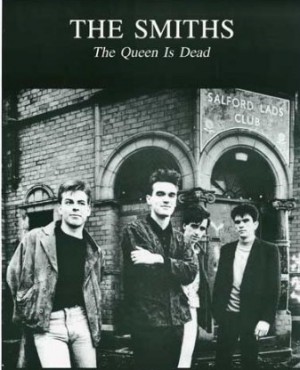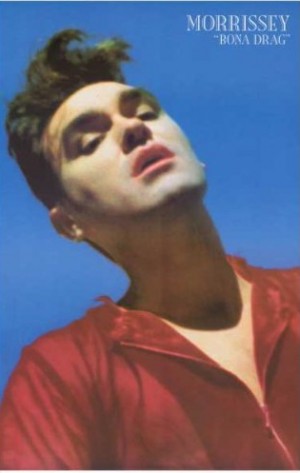
Unless you’re lacking in some serious musical education, you know who Morrissey and The Smiths are. But just in case, I’ll humor those of you who just furrowed your brow thinking “Who?!” The Smiths were a terrific Manchester rock band in the early to late 1980s. They released four studio albums from 1984 to 1987: “The Smiths,” “Meat is Murder,” “The Queen Is Dead,” and “Strangeways, Here We Come.” After their breakup in 1987, lead singer and lyricist, known simply as Morrissey, went solo to release nine studio albums, most recently, 2009’s “Years of Refusal.”
Why are we so still so obsessed with the man? The sometimes profoundly depressing lyrics? The sometimes gut-wrenching hilarious lyrics? The jangly guitar riffs? The enigma that is Morrissey? In 2002, British music magazine NME named The Smiths the most influential artists of the past 50 years. But why exactly does Morrissey still enrapture us? I contacted some notable Morrissey enthusiasts and gathered my own thoughts to find out.
I have been a fan of The Smiths and Morrissey ever since I first heard the plucky guitar intro to “This Charming Man” on the drive back from my local Tower Records (remember when we physically bought music?) where my older sister got the “Best of The Smiths Vol. 1” CD back in 2001. I’ve been a fan ever since. Most fans have a similar, earth-shattering first experience; Jose Maldonado, who hosts the radio show “Breakfast with The Smiths” on Los Angeles’ Indie 103.1, describes his experience in a phone interview:
“I was in a record store and they were playing the brand new Smiths album, at the time “Cemetery Gates” was on, and I stopped what I was doing and just sat there to listen. The song that came after that was “Bigmouth Strikes Again” which was very cathartic, and life changing—in every sense of the word. These amazing guitar tracks with a unique voice and equally unique lyrics that I’d never before heard in my life. And in that moment I needed to know who this band was and what they were all about and the rest is history.”

Maldonado’s show devotes a full two hours to The Smiths, Morrissey, and related artists each week. Maldonado is also the lead singer in Smiths tribute band Sweet and Tender Hooligans and he even played Morrissey in the indie film “My Life with Morrissey,” in addition to his day job as an L.A. County lifeguard.
Through the radio show, I stumbled upon The Smiths Project, a sort of Julie/Julia blog, but replaces the fattening French cooking with the nutritious tunes of The Smiths sung by 34-year-old Janice Whaley. Whaley’s goal is to chronicle the entire Smiths discography, spanning their entire discography but in her own personal vocal style by the end of 2010.
“I’ve always felt a connection to the way each song was written, and how the music and vocals play off each other. Musically speaking, Morrissey and Marr are really night and day but they compliment each other perfectly. For example, just listening to the jangly instrumentation, could you conceive of laying a slow, melodic vocal line on top of that?” Whaley told me via email, referencing the paradoxical juxtaposition of Morrissey and guitarist Johnny Marr in their Smiths years. “The opposite is also true, if you were to only hear Morrissey’s vocals, could you weave in 10 layers of guitars that compliment that without sounding busy or cluttered? I’m also in awe of Morrissey’s quirky and intelligent lyrics. He often tackles difficult or unusual subjects and, in general, he makes you think.”
Singer-songwriter Pete Yorn, who frequently covers Smiths songs live in concert, also told me via Twitter that Morrissey’s lyrics set him apart as a musical icon: “I think I respect Morrissey ‘cause he’s able to articulate what seems to be in his heart and get away with it. The music comes second…He says what’s on his mind and sometimes he says it for us.”
Morrissey’s reach as a lyricist is a clear connecting thread among fans. Maldonado concurs: “I think that speaks to why he such a great singer-songwriter that he is, that fact that years later there are still fans discovering the music for the first time and realizing how timeless those emotional, feelings, and lyrics will always be.”
Inevitably, Morrissey’s appeal is more than just his musical talents. In addition to Morrissey’s

smooth, lulling voice, he is known for his eccentric duds: billowing paisley buttons-downs, cuffed blue jeans, oversized geek specs, and of course, his cartoon-ish coiffure, coveted by twenty-something hipsters worldwide. Whaley stated: “I definitely think Morrissey is an icon. His signature hair style, unmistakable voice, his views on the world…it all works together to make a completely unique human being that many strive to emulate.”
“I think it’s funny that he’s perceived as a sex symbol,” Crystal Becerril said, recalling Morrissey whip off his shirt in a salacious frenzy during a concert. Becerril, host of “Love is Noise” on BU’s own WTBU, said “As much as I want to think the music is separate from a musician’s personal life, it’s completely connected.” Becerril and Morrissey share similar views on vegetarianism and animal rights and she views this as furthering her connection to the music, rather than creating it.
“There is a certain time where I just cannot listen to them or else I think I might jump off a bridge,” Becerril joked. But fellow DJ Maldonado disagreed when he said:
“I’m going to tell you the God’s honest truth: driving home from a gig or driving home from the radio station, I am listening to Morrissey and The Smiths on the way home…It really takes a special kind of artist to, generations later, still be reaching out to new audiences. Most artists that are true to themselves would trade being a Britney Spears pop star who is loved by so many millions, for maybe someone who was loved by a select few, and will continue to be loved for generations to come. It’s an envious place to be. What’s really crazy is after all these years I find myself still attached to this artist, I still get butterflies in my stomach waiting to see what it’s gonna be like—before I even get to hear the songs, just to hear the titles of the songs, that anticipation to see what is “Satan Rejected My Soul” going to be about. He’s unique in that sense, I don’t feel that same sense of anticipation for really anyone else.”

Morrissey’s lyrics are truly poetic, crafting together verses that capture raw emotion with the sharp signature Morrissey wit we’ve come to know and love through his prolific 26-year career. His introverted, wilting flower persona, longing for love and affection has been upgraded into a strong and confident singer-songwriter that has gained the undying devotion he desperately yearned for and sings about consistently. Morrissey is not just a lad to listen to when you’re depressed on a rainy day and feeling like a tortured soul; he tells melancholy tales of heartbreak and longing and the humanness of desperation and sadness through sometimes hilarious lyrics, sometimes tragically lonely lyrics juxtaposed alongside danceable melodies.
Maldonado recalled one of his favorite Morrissey lyrics from 1994’s “Speedway,” which states “In my own sick way, I’ll always stay true to you.” He confessed “For me, sums up what my relationship means, my love for Morrissey, in my own sick way.”


strange while google’ britney spears this comes up.
i love both artists and well, why wouldn’t i.
You can’t have enough Morrissey. In fact I love http://www.morrissey-solo.com, where I can read stuff like this. Also, The Smiths are huge in the Gen Xer community, so thanks for putting this piece together. Nicely done!
McCrank’s Juke
Just came across this article after perusing Moz-related stuff (again) on t’internet. It’s great to know there are young people getting into Moz/Smiths for the first time in the 21st.century.
I’m an old codger, the same age as Steven Patrick, and first saw The Smiths in Glasgow in 1984. I saw them four times in total, and have seen Morrissey about 30 times over the years. Moz-itis is a lifelong condition for many of us, one we’ll never shake off. Not that we would want to, of course. Thanks.
Her music was quite renowned, folks about me loves her and her music. I hope she was back to be big again